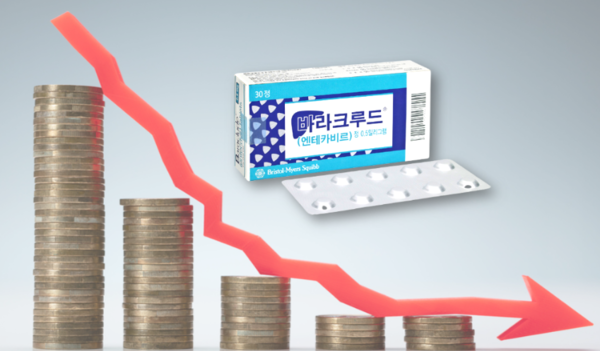BMS adopts ‘trade-off’ strategy as Onureg becomes reimbursable after Inrebic’s inclusion

US-based pharmaceutical company, Bristol-Myers Squibb (BMS), has witnessed a series of price reductions for its patent-expired B-type hepatitis treatment, ‘Baraclude’, following the inclusion of a new drug in health insurance coverage. The price adjustments are part of a 'trade-off' strategy implemented by BMS to facilitate the reimbursement of the latest medication in their portfolio.
According to the pharmaceutical industry on July 21st, health insurance coverage is set to include BMS Pharmaceuticals' 'Onureg Capsules' (active ingredient: azacitidine), a treatment for acute myeloid leukemia starting from August 1st. The maximum reimbursement amount for this medication has been capped at $1183.27. BMS has established various reimbursement types, including ‘refund’, ‘expenditure cap’, and ‘utilization cap’ reimbursements.
Under the 'refund' reimbursement type, BMS will reimburse a certain percentage of the claimed amount for the drug. The 'expenditure cap' reimbursement type will involve the company providing a percentage of any excess spending if the drug costs more than a predefined yearly limit. Lastly, the 'utilization cap' reimbursement type sets segments, and the company will reimburse a percentage of any extra spending within those segments.
Additionally, BMS has voluntarily lowered the price of Baraclude. In June 2022, when 'Inrebic', a new treatment for myelofibrosis (active ingredient: fedratinib hydrochloride hydrate), was added to the reimbursement list, the price of Baraclude was reduced. Now, just two months later, further adjustments are being made.
The maximum price of Baraclude 0.5mg has been gradually reduced from its previous value of $3.064 to $3.030, and it will undergo another reduction to $3.006 starting August. As for the 1.0mg dosage, its initial price of $3.470 has been adjusted to $3.430, and from next month, it will be set at $3.403. It’s worth noting that the patent for Baraclude expired in 2015.
The trend of voluntary price reductions for drugs with expired patents has been observed in response to Merck's (MSD) immune checkpoint inhibitor, Keytruda (active ingredient: pembrolizumab), as a means to facilitate the inclusion of new drugs in health insurance coverage. For instance, when MSD secured Keytruda's coverage, the company voluntarily reduced the prices of three other products, including 'Januvia' (a total of 15 items). Astellas also lowered the price of its overactive bladder treatment 'Vesicare' to support the inclusion of the acute myeloid leukemia therapy 'Xospata' (active ingredient: gilteritinib). Additionally, Janssen adjusted the price of 'Zytiga' for the inclusion of the prostate cancer treatment 'Erleada' (active ingredient: apalutamide).
Pharmaceutical companies have been considering price adjustments for drugs with expired patents as a viable means to introduce new medications without substantial price reductions. However, concerns about this approach have been voiced, as it may potentially lead to a downward trend in drug pricing. With uncertainty surrounding the impact of this strategy persisting, experts in the field are calling for careful consideration and evaluation of its long-term effects.

